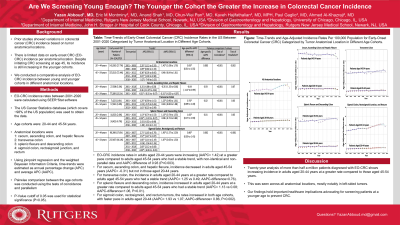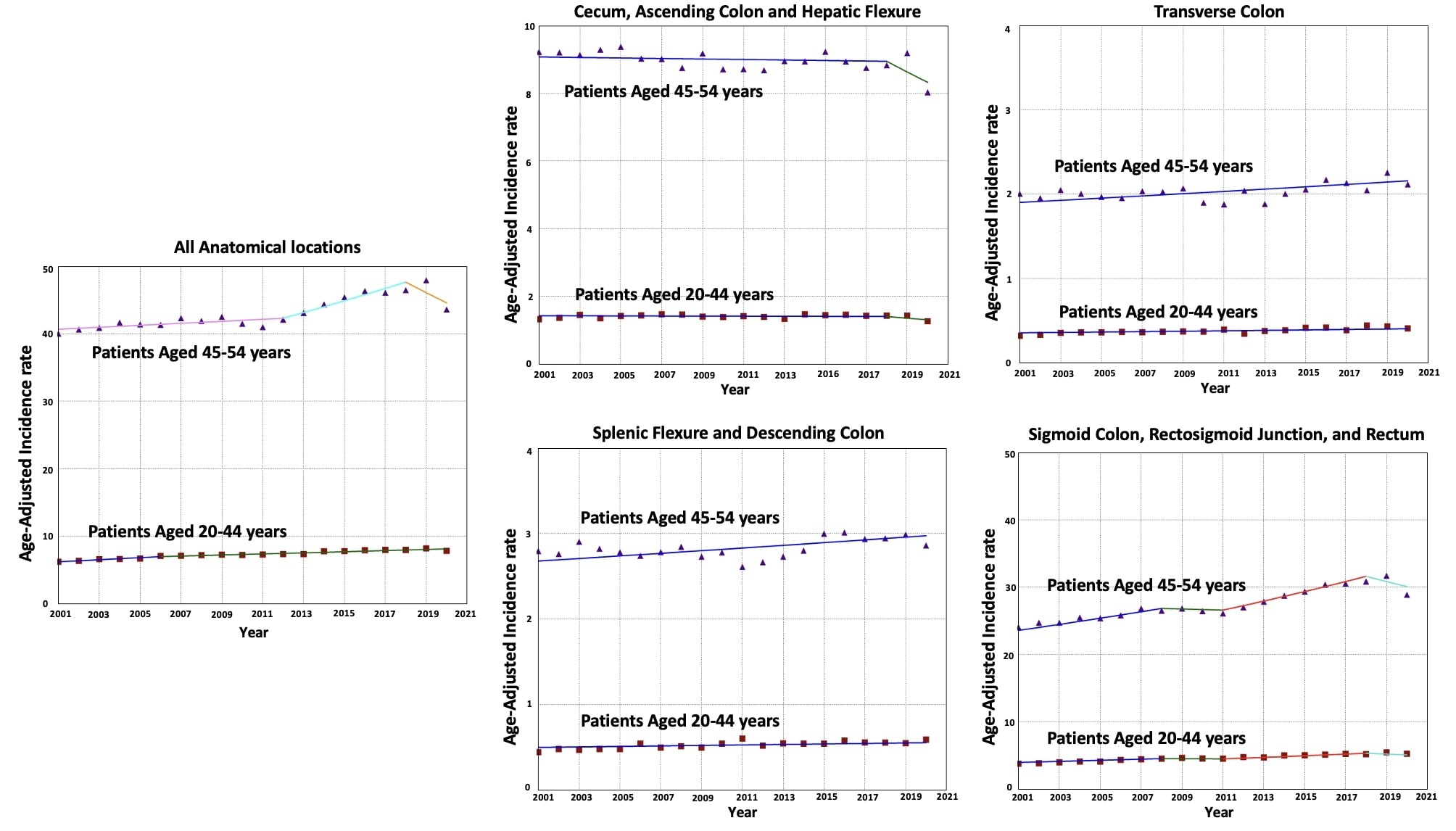Tuesday Poster Session
Category: Colorectal Cancer Prevention
P3866 - Are We Screening Young Enough? The Younger the Cohort the Greater the Increase in Colorectal Cancer Incidence
Tuesday, October 29, 2024
10:30 AM - 4:00 PM ET
Location: Exhibit Hall E

Has Audio
.jpg)
Yazan Abboud, MD
Rutgers New Jersey Medical School
Newark, NJ
Presenting Author(s)
Yazan Abboud, MD1, Eric Montminy, MD2, Anand Shah, MD3, Chun-Wei Pan, MD4, Kaveh Hajifathalian, MD1, Paul Gaglio, MD5, Ahmed Al-Khazraji, MD1
1Rutgers New Jersey Medical School, Newark, NJ; 2Center for Endoscopic Research and Therapeutics (CERT), University of Chicago, Chicago, IL; 3Rutgers New Jersey Medical School, Harrison, NJ; 4John H. Stroger, Jr. Hospital of Cook County, Chicago, IL; 5Rutgers NJ Medical School, Newark, NJ
Introduction: Prior studies showed variations in colorectal cancer (CRC) incidence based on tumor anatomical locations. There is limited data on early-onset CRC (EO-CRC) incidence per anatomical location. Despite initiating CRC screening at age 45, its incidence is still increasing in the younger cohorts. Therefore, we conducted a comprehensive comparative analysis of EO-CRC incidence between young and younger cohorts in different anatomical locations.
Methods: EO-CRC age-adjusted incidence rates between 2001-2020 were collected from the US Cancer Statistics database (covers ~98% of US population). Age cohorts were: 20-44 and 45-54 years. Anatomical locations were 1: cecum, ascending colon, and hepatic flexure, 2: transverse colon, 3: splenic flexure and descending colon, and 4: sigmoid colon, rectosigmoid junction, and rectum. Using joinpoint regression and the weighted Bayesian Information Criteria, time-trends were estimated as annual percentage change (APC) and average APC (AAPC) (P< 0.05).
Results: EO-CRC incidence rates in adults aged 20-44 years (142,362 patients) were increasing (AAPC= 1.42, P< 0.001) at a greater pace compared to adults aged 45-54 years (372,513 patients) who had a stable trend (AAPC= 0.48, P=0.06), with non-identical and non-parallel data and absolute AAPC difference of 0.93 (P=0.003) (Table and Figure).
For cecum, ascending colon, and hepatic flexure, incidence decreased in adults aged 45-54 years (AAPC= -0.31, P=0.01) but not in those aged 20-44 years (AAPC= -0.35, P=0.49).
For transverse colon, incidence increased in adults aged 20-44 years at a greater rate compared to adults aged 45-54 years who had a stable trend (AAPC= 1.25 vs 0.49; AAPC-difference=0.76, P=0.02).
For splenic flexure and descending colon, incidence increased in adults aged 20-44 years at a greater rate compared to adults aged 45-54 years who had a stable trend (AAPC= 1.13 vs 0.08; AAPC-difference=1.06, P=0.01).
Lastly, for sigmoid colon, rectosigmoid, and rectum tumors, the rates increased in both age cohorts, with faster pace in adults aged 20-44 (AAPC= 1.93 vs 1.07; AAPC-difference= 0.86, P=0.002).
Discussion: Twenty-year analysis of more than half a million patients diagnosed with EO-CRC shows increasing incidence in adults aged 20-44 years at a greater rate compared to those aged 45-54 years. This was seen across all anatomical locations, mostly notably in left-sided tumors. Our findings hold important healthcare implications advocating for screening patients at a younger age to prevent CRC.

Note: The table for this abstract can be viewed in the ePoster Gallery section of the ACG 2024 ePoster Site or in The American Journal of Gastroenterology's abstract supplement issue, both of which will be available starting October 27, 2024.
Disclosures:
Yazan Abboud, MD1, Eric Montminy, MD2, Anand Shah, MD3, Chun-Wei Pan, MD4, Kaveh Hajifathalian, MD1, Paul Gaglio, MD5, Ahmed Al-Khazraji, MD1. P3866 - Are We Screening Young Enough? The Younger the Cohort the Greater the Increase in Colorectal Cancer Incidence, ACG 2024 Annual Scientific Meeting Abstracts. Philadelphia, PA: American College of Gastroenterology.
1Rutgers New Jersey Medical School, Newark, NJ; 2Center for Endoscopic Research and Therapeutics (CERT), University of Chicago, Chicago, IL; 3Rutgers New Jersey Medical School, Harrison, NJ; 4John H. Stroger, Jr. Hospital of Cook County, Chicago, IL; 5Rutgers NJ Medical School, Newark, NJ
Introduction: Prior studies showed variations in colorectal cancer (CRC) incidence based on tumor anatomical locations. There is limited data on early-onset CRC (EO-CRC) incidence per anatomical location. Despite initiating CRC screening at age 45, its incidence is still increasing in the younger cohorts. Therefore, we conducted a comprehensive comparative analysis of EO-CRC incidence between young and younger cohorts in different anatomical locations.
Methods: EO-CRC age-adjusted incidence rates between 2001-2020 were collected from the US Cancer Statistics database (covers ~98% of US population). Age cohorts were: 20-44 and 45-54 years. Anatomical locations were 1: cecum, ascending colon, and hepatic flexure, 2: transverse colon, 3: splenic flexure and descending colon, and 4: sigmoid colon, rectosigmoid junction, and rectum. Using joinpoint regression and the weighted Bayesian Information Criteria, time-trends were estimated as annual percentage change (APC) and average APC (AAPC) (P< 0.05).
Results: EO-CRC incidence rates in adults aged 20-44 years (142,362 patients) were increasing (AAPC= 1.42, P< 0.001) at a greater pace compared to adults aged 45-54 years (372,513 patients) who had a stable trend (AAPC= 0.48, P=0.06), with non-identical and non-parallel data and absolute AAPC difference of 0.93 (P=0.003) (Table and Figure).
For cecum, ascending colon, and hepatic flexure, incidence decreased in adults aged 45-54 years (AAPC= -0.31, P=0.01) but not in those aged 20-44 years (AAPC= -0.35, P=0.49).
For transverse colon, incidence increased in adults aged 20-44 years at a greater rate compared to adults aged 45-54 years who had a stable trend (AAPC= 1.25 vs 0.49; AAPC-difference=0.76, P=0.02).
For splenic flexure and descending colon, incidence increased in adults aged 20-44 years at a greater rate compared to adults aged 45-54 years who had a stable trend (AAPC= 1.13 vs 0.08; AAPC-difference=1.06, P=0.01).
Lastly, for sigmoid colon, rectosigmoid, and rectum tumors, the rates increased in both age cohorts, with faster pace in adults aged 20-44 (AAPC= 1.93 vs 1.07; AAPC-difference= 0.86, P=0.002).
Discussion: Twenty-year analysis of more than half a million patients diagnosed with EO-CRC shows increasing incidence in adults aged 20-44 years at a greater rate compared to those aged 45-54 years. This was seen across all anatomical locations, mostly notably in left-sided tumors. Our findings hold important healthcare implications advocating for screening patients at a younger age to prevent CRC.

Figure: Figure: Time-Trends and Age-Adjusted Incidence Rates Per 100,000 Population for Early-Onset Colorectal Cancer (CRC) Categorized by Tumor Anatomical Location in Different Age Cohorts (Patients Aged 45-54 years and Patients Aged 20-44 years).
Note: The table for this abstract can be viewed in the ePoster Gallery section of the ACG 2024 ePoster Site or in The American Journal of Gastroenterology's abstract supplement issue, both of which will be available starting October 27, 2024.
Disclosures:
Yazan Abboud indicated no relevant financial relationships.
Eric Montminy indicated no relevant financial relationships.
Anand Shah indicated no relevant financial relationships.
Chun-Wei Pan indicated no relevant financial relationships.
Kaveh Hajifathalian indicated no relevant financial relationships.
Paul Gaglio indicated no relevant financial relationships.
Ahmed Al-Khazraji indicated no relevant financial relationships.
Yazan Abboud, MD1, Eric Montminy, MD2, Anand Shah, MD3, Chun-Wei Pan, MD4, Kaveh Hajifathalian, MD1, Paul Gaglio, MD5, Ahmed Al-Khazraji, MD1. P3866 - Are We Screening Young Enough? The Younger the Cohort the Greater the Increase in Colorectal Cancer Incidence, ACG 2024 Annual Scientific Meeting Abstracts. Philadelphia, PA: American College of Gastroenterology.
